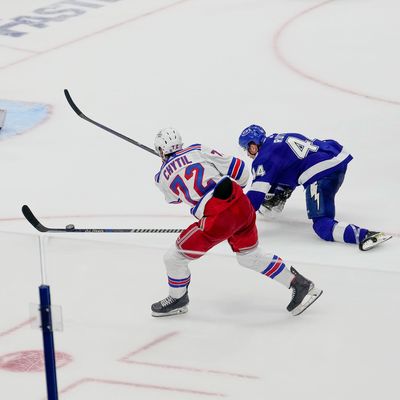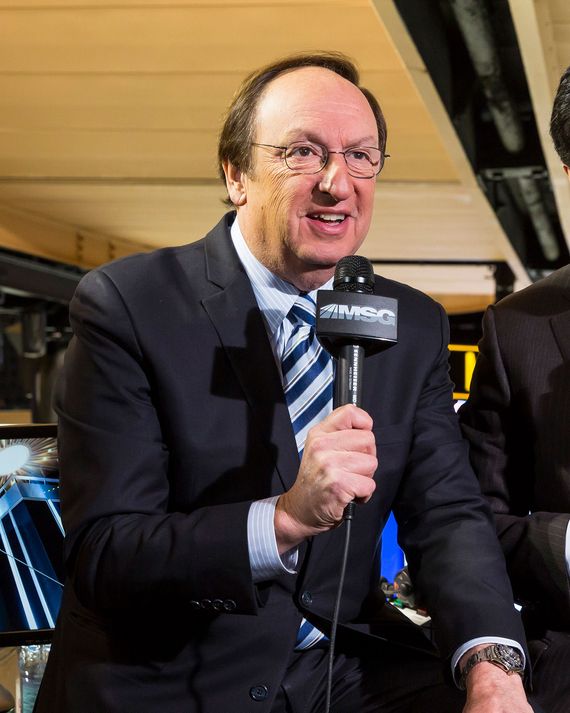
The venerable broadcaster Sam Rosen has been calling New York Rangers games on the MSG Network since 1984. But because national channels now televise all playoff games after the first round, he’d long been relegated to a role on the network’s pre- and postgame shows if the team went on a major postseason run. This was “unsatisfying,” he says. “From a play-by-play person’s standpoint, you want to be there and calling the action.”
So when Rosen, 74, negotiated a new contract following the team’s relatively successful postseasons in the 2010s, he had a request: to get the call if the team’s usual radio announcer, Kenny Albert, had to miss a game because of his work on national TV broadcasts. That wound up happening a number of times this spring, including for the first four contests in the Eastern Conference Final against the Tampa Bay Lightning. Rosen is now calling Rangers games this deep into the playoffs for the first time since the team’s 1994 Stanley Cup season, albeit not in his usual medium.
With the Rangers up two games to one on Tampa Bay and just two wins from making the Stanley Cup Final — during a postseason many predicted they wouldn’t even be participating in — the Hall of Fame broadcaster spoke with Intelligencer on Monday about why the Rangers are peaking, the danger of playing so many long series, and the call he feels he absolutely nailed.
It feels like the Rangers are hitting their stride at the right time. They weren’t playing their best hockey when they went down 3-1 to Pittsburgh at the beginning of the playoffs, but they’ve generally gotten better as the postseason has gone on. What are they doing now that they weren’t doing before?
I’ve always maintained that this Rangers team would become a serious Stanley Cup contender when their young kids matured and became major contributors to the team. And that’s what’s been developing in the playoffs. These kids are very talented, and they’re playing under the pressure of the playoffs, but I think they’ve been handled very, very well by coach Gerard Gallant. There’s not been undue pressure put on them. The coach has kept an even keel and encouraged them. He’s put them together. We’re talking about Filip Chytil, 22 years old; Kaapo Kakko, 21; and Alexis Lafrenière, 20 years old. Lafrenière was excellent in the series against Pittsburgh. Chytil came alive against Carolina. And Kaapo Kakko has just been kind of a steady, steady contributor. So I think that now the Rangers have become not just a two-line team with the focus on their star players like Mika Zibanejad and Chris Kreider and Artemi Panarin and Ryan Strome. When you add this young line to it, now there are three lines that the opposition has to worry about, and that has helped make the Rangers serious contenders. These young kids have matured probably faster than anyone expected.
The Rangers played so well at the end of the Carolina series, and they played about as well as they can play in the first two games against Tampa Bay. Even the start of game three, they looked pretty good. And then the wheels kind of came off around the start of the third period Sunday.
I think you’re being a little harsh, Joe!
Well, I’ll put it this way: What happened in that third period that differed from what the Rangers had been doing in the previous games?
I don’t think it was what they were doing. More so it was what Tampa was doing. Someone texted me about the Rangers giving up the lead and letting the game get away. And I texted back and said, “This is not a game in February against the Ottawa Senators. This is a game against the two-time defending Stanley Cup champions. And they’re not going quietly.” The Lightning played desperate hockey, and that’s a great team that the Rangers are facing with so many members still there from both championships. They went all out: 51 shots in the game, 19 in the third period. Certainly the loss of Ryan Strome early in the second period affected the Rangers’ game. But the Lightning were the ones that made the big push. And with 19,000 fans, most of them Lightning fans, urging them on, it was what the Lightning did in that game more than what the Rangers didn’t do.
How much do you think it matters that the Rangers have played a lot of hockey in these playoffs — the maximum number of games through the first-year rounds, including one game that was practically two games on its own.
It can be a factor. I think back to the championship team in ’94, and the Rangers got through the first two rounds of the playoffs against the Islanders and the Washington Capitals in nine games. And I think that helped them in the long run because they played a grueling seven-game series with the Devils and then what turned into a very tough seven-game series with Vancouver. The Rangers were a physically battered team in that final. A lot of guys that were playing injured, and several guys were out of the lineup because of injuries. But I will say this: One of the things that’s noticeable about the way Gerard Gallant is handling things is that the guys are getting sufficient rest. The games are every other day, and on the off days, he basically makes it a light optional skate. The majority of the regulars come in for meetings and then they go back and relax the rest of the day. The morning of the game, some players might go out for a quick skate, but they’re very careful about how much rest the guys get. And as the coach said, the players love it because they don’t worry about practice. They just have to prepare for the games, the meetings, the video tapes, get their preparation in, get any treatment they need from the trainers, and get ready to play the game.
When you have a big call like the Artemi Panarin game-seven overtime winner against Pittsburgh, one that gets spread around and played over and over again, how much does it get back to you that fans love it?
First off, it’s tremendously gratifying, but yes, it does come back because just walking on the street, going to a supermarket, going to get gas, people stop me and comment on it. They’ll talk about how well the team is doing, and then there’ll be a comment about the call and that they really liked it and how exciting it was. My sons and my grandsons always let me know how I’m doing. My grandson called me this morning. He said, “You were really sharp on the play-by-play yesterday.” And there are fans here just walking to the arena from the hotel. They’ve been very happy that I’ve been doing the play-by-play, and that means an awful lot to me.
I was listening to your Sportsnet interview from the other day. You were asked about you favorite call that you’ve done, which was obviously going to be the 1994 Stanley Cup call. But do you have a call — say, since the 2004–5 lockout — where you really felt like you conveyed what you wanted to, that you really captured the moment?
The one that sticks out to me was the 2020 game when Mika Zibanejad scored five goals against Washington. There was tremendous excitement in the building. Alex Ovechkin had scored a couple of goals. Mika just kept filling up the net, and then he scored the overtime winner. And I felt I was right on that call. I really was happy with that and pleased with that and got very good fan reaction from that as well. That was a very special game by a special player.
I’ve been thinking a lot lately about how this team came together, and obviously, your former broadcasting partner John Davidson’s fingerprints are all over it from his time as team president before being fired last summer. Is it bittersweet for you to not have him along for this ride?
Personally, I wish John were a part of it, but he’ll be a part of it because he gave so much of himself to the Rangers as a player, as a broadcaster, and then in management. And for the time that he was there, he did a good job in helping move the team along in a positive direction. The nature of the business is that changes are made, and from a Rangers standpoint, the changes have worked out because the team has continued on and it’s moved along in a positive direction. And you see what current president and general manager Chris Drury has done, and the moves he made going into the season and at the trade deadline that have really helped the team. But yes, John will always have Rangers in him, and he has certainly contributed. His presence and his expertise helped the Rangers move along in a positive direction.
It seems to me like there’s a different feeling in the city when the Rangers are on one of these deep playoff runs than when it’s the Yankees or the Mets or the Giants or whoever. Maybe that just says something about the Rangers’ place in the city’s sports scene, but do you think that’s the case? And if so, why?
I think there are a couple of things that come to mind. One is that hockey is not the No. 1 sport in the pecking order, but the Rangers have been around a long time. There’s great tradition there, and they haven’t won very much. They’ve only won the one championship since 1940. That was in 1994. When you think about it — 28 years — to me, it seems like, Oh, it was just a few years ago that they won a Cup. No, it’s been a long time. It’s a hard championship to win. And I think when the Rangers get close, the depth of the Ranger fans is so great that excitement rises up and it matches the excitement of the other sports. Rangers fans are intense and they’re wonderful.
This interview has been edited and condensed.






























